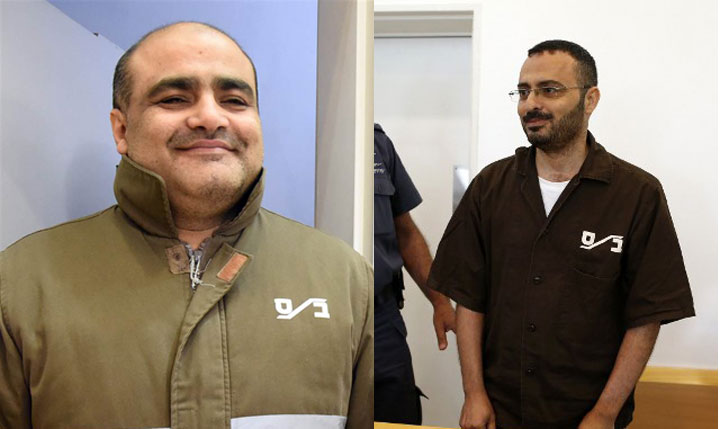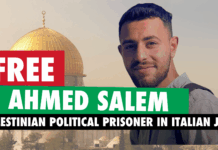by Charlotte Kates

Two Palestinian UN and international NGO workers in Gaza, Mohammed al-Halabi and Waheed Bursh, have been targeted by the Israeli occupation for arrest and military prosecution in high-profile cases that seemingly aim to imprison not only these individual Palestinians, but also to pressure international agencies into a further separation and deeper division from the Palestinian people under occupation with whom they work, and towards control and authorization by Israeli occupation forces.
Mohammed al-Halabi, the operations manager for World Vision in Gaza, was arrested by Israeli occupation forces on 15 June as he crossed at the Beit Hanoun/Erez crossing (to which he had already been given a permit by the Israeli occupation.) After being held incommunicado and under interrogation, facing torture and abuse for over a month and a half, Al-Halabi was accused in a showy statement of allegedly “diverting” up to $50 million USD to the Palestinian resistance organization and political party Hamas – based on a “confession.” Despite the allegations, World Vision noted that its “cumulative operating budget in Gaza for the past 10 years was approximately $22.5 million,” making the alleged amounts of money involved materially impossible. World Vision also noted that “Mohammad El Halabi was the manager of our Gaza operations only since October 2014; before that time he managed only portions of the Gaza budget. World Vision’s accountability processes cap the amount individuals in management positions at his level to a signing authority of US$15,000.”
Nevertheless, Israeli prime minister Benjamin Netanyahu issued a video message alleging that the Israeli occupation project “cared more” about Palestinians than Palestinian leadership organizations, particularly Hamas in Gaza. While the Israeli occupation state controls access to Gaza and entirely occupies its sea and skies, it claims to not have control or occupying power over Gaza. Nevertheless, the Israeli occupation state is imprisoning Al-Halabi for matters that – even taking their tortured “confessions” at face value – is seemingly entirely internal to Palestinians in Gaza and international organizations working with them.
It should be noted that the allegations against Halabi appear to be based entirely upon confessions obtained through torture and potentially the word of a collaborator or a “disgruntled employee” who disappeared from Gaza to Egypt after his firing from World Vision by Halabi; this is reflected in the clearly inaccurate financial amounts reported in coverage of this case. Perhaps because of the very weakness of the allegations themselves, Halabi will allegedly be tried in a “secret court,” reported his lawyer, Lea Tsemel. Despite the origins of the allegations (confessions obtained through torture) and their seeming physical impossibility, both the Australian and German governments suspended aid to World Vision. While World Vision has announced its trust in its staff, the cut in funds – and an Israeli freeze on its bank account in Jerusalem for the international Christian charity – has meant that over 120 local Palestinian staff have been laid off in Gaza and operations are suspended, where unemployment already ranges near 40% and poverty forces Palestinians to rely on international aid.
This is not the first run-in between the Israeli state and World Vision. Israel and its supporters in NGO Monitor attacked the Christian charity in 2004 for supporting Palestinian rights, thus “support for terror.” World Vision’s programs came under attack previously by Mossad-linked law firm “Shurat Ha-Din,” known for its pursuit of dubious yet fiscally draining lawsuits against opponents and critics of Israel around the world, Shurat Ha-Din attacked World Vision and other charities for their support for the work of the Union of Agricultural Work Committees, a land and water defense organization operating in the West Bank and Gaza that has been honored with the UN’s Equator Prize and is a member of the global peasant movement, Via Campesina. Shurat Ha-Din demanded an end to Australian support of World Vision, claiming that UAWC was a “front” for Palestinian leftist political party, the Popular Front for the Liberation of Palestine. Shurat Ha-Din’s efforts were rejected in Australia and refuted both by the Australian government and World Vision itself. Still, the continuing focus on World Vision and its engagement with local Palestinian organiztions in Gaza appears to be a continuing thread in Israeli surveillance and repression.
While Halabi was arrested on 15 June, Waheed Bursh, a Palestinian engineer contracted by the UN Development Program (UNDP) was arrested one month later, also as he crossed the Beit Hanoun/Erez crossing, for which he had previously received a permit. The case of Bursh is particularly striking: over two weeks after his arrest, and several days after the public announcement of the allegations against Halabi, he was accused by the Israeli occupation of allegedly “diverting” rubble in Gaza created by the massive Israeli bombing of Gaza in 2014 for Palestinian use to shore up a port and jetty on Gaza’s north shore. The Israeli occupation accuses the rubble of being “diverted to Hamas,” but it is distinctly unclear if that simply means to the Palestinian Authority in Gaza, which is run by Hamas officials – and in any case, the UNDP itself reaffirmed that the rubble in question was directed as agreed to a civilian area and there “was no diversion.”
This case is, essentially, about whether Palestinians have the right to decide in any small way what to do with the massive rubble created when hundreds of thousands of Palestinians’ homes in Gaza were destroyed by Israeli bombs and warplanes – and that any individual Palestinian following Palestinian direction in such a case is subject to torture and imprisonment. Not only does Israel declare the right to bomb and destroy Gaza at will; it also declares the right and ongoing authority to determine the usage of the rubble created by its bombing and destruction.
The Bursh case highlights the insufficiency and the injustice of the UN “reconstruction program” for Gaza, which has seen both an extremely high level of inefficiency as only a small portion of the buildings destroyed in Gaza have been rebuilt, but also an extremely high level of utter disregard for Palestinian sovereignty and internationally-recognized rights, instead creating a program in which all access to funds and building materials is dependent on the approval of the Israeli occupation that destroyed those places to begin with.
The UN has argued that Bursh is immune from prosecution given his UN role, and that he acted according to the request of the Palestinian Authority. This case is not only about the imprisonment of one Palestinian engineer, but about who has the right to build with the rubble created by Israel’s bombs, and who decides: Palestinians, including their political forces? Or international organizations with the consent and oversight of the Israeli occupation? Or, perhaps more precisely, the Israeli occupation, with the work carried out by international organizations and highly subjugated Palestinian staff?
Both the Gaza reconstruction mechanism and the Halabi and Borsh cases highlight the severity of the ongoing Israeli occupation of Gaza as well as an apparent political priority of disempowering Palestinian non-governmental organizations and even staff of international organizations in any context in which they operate outside of complete Israeli control. While the Israeli occupation has generally supported the “NGOization” of Palestinian society as an alternative to Palestinian resistance organizations, these recent cases appear to indicate an intention for Israel to outsource not only the costs but also the repressive mechanisms of its occupation of Gaza to international organizations, thus requiring the dismissal and complete control of any local Palestinian staff empowered to make independent decisions.
Conditional aid that requires all staff at an organization not to be members of any organization on the US list of “foreign terrorist organizations,” such as that distributed by USAID, has commonly been discussed as a long-running problem in Palestinian civil society. The US FTO list includes major Palestinian political forces such as Hamas, the PFLP, Palestinian Islamic Jihad and even Fateh’s armed wing; similar lists are to be found in the European Union, Canada, Australia, the UK and elsewhere – although Hamas is currently fighting a legal case for removal from the EU’s list. Further, the overall impact of international donor funds in directing the priorities of Palestinian organizations away from Palestinian national liberation and towards “projects” and state-building amid ongoing occupation and oppression, and demobilizing the Palestinian national movement into “civil society” or “interest groups” has been the subject of intense discussion among Palestinian organizations and activists.
In Gaza in particular, the filing and heavy publicity surrounding the Halabi and Bursh cases seems to indicate that the Israeli state is pursuing an even heavier hand on all forms of Palestinian organization and even Palestinian roles in directing the work of international organizations. Palestinian organizations in 1948 Palestine have come under attack through new laws designed to block “foreign funding,” while the Balad/National Democratic Assembly political party, represented in the Knesset by Jamal Zahalka, Haneen Zoabi and Basil Ghattas, has been subject to a series of raids and arrests accusing them of undisclosed “foreign funds.” Of course, Palestinian organizations like Addameer Prisoner Support and Human Rights Association, the Palestinian Prisoners’ Center for Studies and other organizations in the West Bank continue to be subject to arrests, raids and other attacks by occupation forces, while Israel continues to threaten escalation against Palestinian civil society organizations supporting the growing boycott, divestment and sanctions (BDS) movement. Ben White in Al-Jazeera noted that “Israeli minister Gilad Erdan has claimed that the accusations against Halabi prove the government’s claim that ‘there are extensive ideological and monetary ties between terrorist organisations and delegitimisation organisations that work against Israel.'”
Ali Abunimah of the Electronic Intifada wrote, “But by spreading sensational allegations that a group as well-known as World Vision is ‘funding terrorism,’ Israel may seek to put other organizations and the Israel-friendly Western governments that fund them on notice that all their operations, especially in Gaza, are at its mercy. It may also be an effort to break growing solidarity for Palestinians in churches, where there has been a strong push to hold Israel accountable through boycott, divestment and sanctions.”
These allegations perhaps bear the closest resemblance to early-to-mid-2000s calls from the Israeli occupation and Western states regarding “corruption” in the Palestinian Authority under Yasser Arafat. Viewing the PA’s role in outsourcing the costs of occupation and suppressing Palestinian resistance as apparently insufficient, Israeli and Western charges of corruption and demands for higher levels of international and Israeli control led in part to the imposition of Mahmoud Abbas as a prime minister and the “Daytonization” of PA security forces under US command, removing Fateh loyalists and turning them into even more of a direct mechanism for security cooperation with the Israeli occupation.
Circumstances differ in that corruption in the PA was – and remains – a legitimate concern of Palestinians (although higher levels of Israeli and international control in fact exacerbated the problem and were opposite to the solutions demanded by Palestinians), while in these cases the arrests reflect entirely Israeli interests at the expense of Palestinians. However, the projected outcomes are similar in the re-orienting of international organizations as opponents and monitors of Palestinians and the escalation of international and Israeli control at the expense of even the most individual and basic levels of Palestinian control or self-determination.
The roots of the prosecution of Halabi and Bursh, the shuttering of World Vision’s programs and the threat of further raids and prosecutions against Palestinian staff of international organizations can also be found in the use of “foreign terrorist lists” by international states and bodies to criminalize Palestinian political life and resistance. While the United States, European Union, Canada, UK, Australia and other states are clearly not opponents of either state-sponsored or non-state violence when carried out by allies and agents, and while Palestinians are internationally recognized as an occupied people with rights to sovereignty and self-determination, Palestinian resistance organizations are routinely labeled as “terrorist.” In the post-Oslo era, the drive to redefine the Palestinian struggle from an anti-colonial national liberation movement into a “state-building project” and a “mediated conflict” with the Palestinian Authority as its reference has been used to criminalize and prosecute Palestinian organizing not only inside but also outside Palestine, while obscuring the nature of Palestinian reality today.
That governments such as those of Australia and Germany chose to cut funding to World Vision in response to these allegations rather than defend an occupied people under colonization and denounce the actions of a belligerent occupier abducting and accusing people under occupation of using funds and, indeed, the rubble created by the occupier’s bombing, in their own interest, indicates the enmeshment of these states with the Israeli state in a common support for settler colonialism, Zionism and racism in Palestine and internationally.
From the siege on Gaza – against which the Women’s Boat to Gaza today sails with the support of people’s movements and against the will of Western states and the Israeli occupation – to the imprisonment of over 7,000 Palestinian prisoners, it is nearly impossible to support fundamental Palestinian rights while labeling Palestinian resistance as “terrorist.” Attempts to do so are then only more vulnerable to attacks of this type – while local Palestinian staff attempting to serve their people within the context of international organizations are targeted for secret trials and persecution on the basis of torture-borne “confessions,” even if the charges themselves are materially incoherent or manifestly absurd. Thus, the international reconstruction mechanism in Gaza has only allowed a greater level of Israeli occupation and control of the Strip, while years after Israel’s bombing, Palestinians in Gaza are still living in shelters while their homes remain rubble.
International mobilization in defense of Halabi and Bursh is necessary. It is not enough to demand a “fair trial” when the charges and structure of prosecution exist only as a mechanism of colonialism. It is urgent to stand not only against the persecution of these Palestinian staff but against the entire framework that seeks to undermine Palestinian sovereignty, redefine resistance as “terror” and legitimize ongoing colonization and occupation.
Charlotte Kates is the international coordinator of Samidoun Palestinian Prisoner Solidarity Network. She coordinates the National Lawyers Guild’s International Committee and works with a number of organizations advocating for Palestinian rights.
Discover more from Samidoun: Palestinian Prisoner Solidarity Network
Subscribe to get the latest posts sent to your email.




